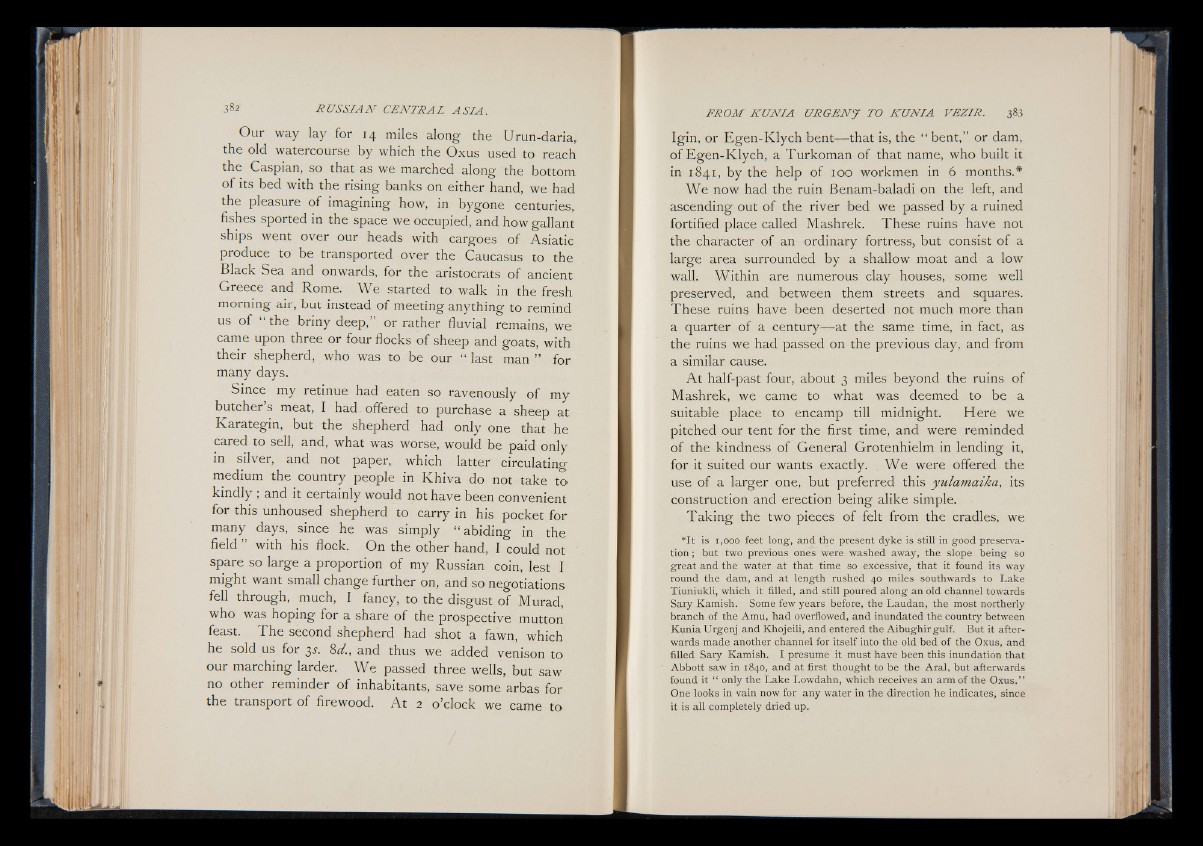
Our way lay for 14 miles along the Urun-daria,
the old watercourse by which the Oxus used to reach
the Caspian, so that as we marched along the bottom
of its bed with the rising banks on either hand, we had
the pleasure of imagining how, in bygone centuries,
fishes sported in the space we occupied, and how gallant
ships went over our heads with cargoes of Asiatic
produce to be transported over the Caucasus to the
Black Sea and onwards, for the aristocrats of ancient
Greece and Rome. We started to walk in the fresh
morning air, but instead of meeting anything to remind
us o f “ the briny deep,” or rather fluvial remains, we
came upon three or four flocks of sheep and goats, with
their shepherd, who was to be our “ last man ” for
many days.
Since my retinue had eaten so ravenously of my
butcher’s meat, I had offered to purchase a sheep at
Karategin, but the shepherd had only one that he
cared to sell, and, what was worse, would be paid only
in silver, and not paper, which latter circulating
medium the country people in Khiva do not take to
kindly , and it certainly would not have been convenient
for this unhoused shepherd to carry in his pocket for
many days, since he was simply “ abiding in the
field ” with his flock. On the other hand, I could not
spare so large a proportion o f my Russian coin, lest I
might want small change further on, and so negotiations
fell through, much, I fancy, to the disgust of Murad,
who was hoping for a share o f the prospective mutton
feast. The second shepherd had shot a fawn, which
he sold us for 3If. Sid., and thus we added venison to
our marching larder. We passed three wells, but saw
no other reminder of inhabitants, save some arbas for
the transport of firewood. A t 2 o ’clock we came to
Igin, or Egen-Klych bent— that is, the “ bent,” or dam,
of E gen-Klych, a Turkoman of that name, who built it
in 1841, by the help of 100 workmen in 6 months.*
We now had the ruin Benam-baladi on the left, and
ascending out of the river bed we passed by a ruined
fortified place called Mashrek. These ruins have not
the character of an ordinary fortress, but consist of a
large area surrounded by a shallow moat and a low
wall. Within are numerous clay houses, some well
preserved, and between them streets and squares.
These ruing have been deserted not much more than
a quarter of a century— at the same time, in fact, as
the ruins we had passed on the previous day, and from
a similar cause.
A t half-past four, about 3 miles beyond the ruins of
Mashrek, we came to what was deemed to be a
suitable place to encamp till midnight. Here we
pitched our tent for the first time, and were reminded
of the kindness of General Grotenhielm in lending it,
for it suited our wants exactly. We were offered the
use of a larger one, but preferred this yulamaika, its
construction and erection being alike simple.
Taking the two pieces of felt from the cradles, we
*It is 1,000 feet long, and the present dyke is still in good preservation
; but two previous ones were washed away, the slope being so
great and the water at that time so excessive, that it found its way
round the dam, and at length rushed 40 miles southwards to Lake
Tiuniukli, which it filled, and still poured along an old channel towards
Sary Kamish. Some few years before, the Laudan, the most northerly
branch of the Amu, had overflowed, and inundated the country between
Kunia Urgenj and Khojeili, and entered the Aibughir gulf. But it afterwards
made another channel for itself into the old bed of the Oxus, and
filled Sary Kamish. I presume it must have been this inundation that
Abbott saw in 1840, and at first thought to be the Aral, but afterwards
found it “ only the Lake Lowdahn, which receives an arm of the Oxus.”
One looks in vain now for any water in the direction he indicates, since
it is all completely dried up.